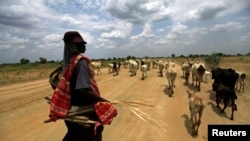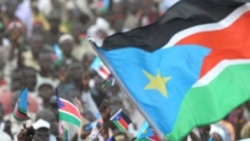As South Sudan tries to break its economic dependence on oil, it is looking to another resource it has in abundance: livestock.
The world's newest nation has more cattle, goats and sheep than it has people. According to the U.N. Food and Agricultural Organization (FAO), South Sudan had 11 million cows, 19 million goats and sheep, and around 12 million people in 2011.
Eighty percent of the population of South Sudan depends on livestock for their livelihood, the FAO said.
So, the thinking in some circles is, why not tap into livestock to try to wean the country off its economic dependence on oil and improve people's living standards?
Last week, more than 20 community leaders from the Greater Bahr el Ghazal region met in Wau to draft a new framework policy for livestock, to do just that. The policy is aimed at making herding more profitable for the country, and at changing the way South Sudanese look at their cattle.
"We are talking of diversifying the economy to not only think of an oil-based economy. We think we have to look at other resources,” Samuel Wakhusama, the regional coordinator for livestock for the Intergovernmental Authority on Development (IGAD), which was one of the organizers of last week’s meeting, said.
Livestock exports by 2020
Wakhusama said IGAD is optimistic that South Sudanese livestock could be sold regionally, and, by 2020, internationally if the sector is built up and professionalized. A key part of achieving that is to come up with some guidelines and change the way South Sudanese look at livestock, he said.
“We need to tickle the government a little bit to recognize that livestock is there and it is the way out of poverty. Once people have a better investment, they realize the importance of making livestock-rearing a business," he said.
Jacob Korok, the director of veterinary services in the South Sudan Ministry of Livestock and Fisheries, said the policies that are being drafted aim to change the way cattle-keepers thinking about their livestock. They need to start looking at their herds as a resource that can benefit the entire nation, not just them, he said.
Livestock... is the way out of poverty.Samuel Wakhusama, IGAD regional coordinator for livestock
"We can actually catch up the world... This policy will promote our economy and will promote our livelihood of our people in the country," Korok said.
But Benjamin Makoi, a cattle keeper from Lakes state who attended the meeting, said putting together a new policy is not enough to boost the livestock sector. What cattle keepers need most is better security, he said.
"If insecurity stops, then it will benefit the pastoralists because there will be free movement, no looting and no killing. In this way the policies could actually be implemented peacefully and it will benefit the communities of South Sudan,” Makoi said.
Wakhusama, the regional coordinator for IGAD, agreed. Before South Sudan can realize its potential as a livestock exporter, he said, peace needs to be restored in the country.
Only when that happens, Wakhusama said, will there be room for development, of livestock or otherwise, in South Sudan.
South Sudan is the most oil-dependent country in the world. Nearly all exports, fiscal revenues, and 80 percent of gross domestic product (GDP) come from oil, according to the World Bank. Agriculture and livestock work account for around 15 percent of GDP.
Meetings will be held in the next few weeks to draft livestock policies in the Equatoria region and Upper Nile, currently South Sudan's biggest oil producer and one of the states most affected by the conflict in the country.








